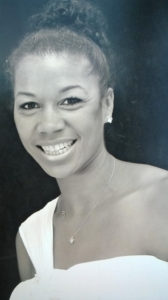 Laure Gnagbé Blédou whose short story, “I Haven’t Returned”, was shortlisted in August 2016 for Writivism short story competition, is passionate, a woman, lover, mother, daughter, sister, cousin, friend, Africa-ddict, thirty-something, impatient, Ivorian, French, human, reader, speaker, writer, demanding, citizen, vegetarian, traveller, road-trip fan, learner, book-lover, bridge-lover, chocolate-lover, music enthusiast, sharer, feminist, old-school, new-school, journalist.
Laure Gnagbé Blédou whose short story, “I Haven’t Returned”, was shortlisted in August 2016 for Writivism short story competition, is passionate, a woman, lover, mother, daughter, sister, cousin, friend, Africa-ddict, thirty-something, impatient, Ivorian, French, human, reader, speaker, writer, demanding, citizen, vegetarian, traveller, road-trip fan, learner, book-lover, bridge-lover, chocolate-lover, music enthusiast, sharer, feminist, old-school, new-school, journalist.
Submitted in the French category, here is the English translation, done by Ivorian Edwige Dro.
I haven’t returned
Pointing towards the imposing white cabinet, Stéphanie calls out to the waitress.
“Madam, excuse me, could you turn it down a bit?”
Sigh of the waitress. Pointed look of Stéphanie. A battle between four dark eyes. Here, Stéphanie has learned that the customer isn’t always right. As a friend once told her to think like the sales assistants or the waiters. From their standpoint, it is thanks to them that the business works. To see that the boss needs them, and the customer as well!
Thankfully, swift victory that evening. No wahala. The waitress grabs the remote control and presses twice on a button. She is generous. With every beep she hears, Stéphanie knows that she is earning a degree. With a bit of luck, it will be 17 or 18 in a few minutes and they will be able to order.
For Stéphanie, the air con is always too much. In this restaurant, as well as in the shopping centres, the waiting room at the dentist, or in her office. Her colleagues constantly tease her Stéphanie for liking only natural cold.
You just had to laugh. Isn’t it funny that it feels like you’ve stepped into a fridge in Côte d’Ivoire. “In Africa”, as her many friends and acquaintances in Europe refer to it.
With time, Stéphanie had learned to just accept some things in each of her environments: the tightly packed Métro in Paris and the dog shit, the lack of pavements in Abidjan and the use of toothpicks at the end of meals (in public); sausages for breakfast in London.
But this way of talking about Africa as if it were a country, she has never been able to accept. Hearing “she lives in Africa”, made her see red. Almost on the edge of violence. How to behave, when the culprits were loved ones? Explain. Explain. Explain that if you have a friend who lives in Italy, you don’t introduce him by saying that he lives in Europe, right? And you don’t go on to tell him that you love his country because you’ve been to Sweden, and you don’t also add that you love Paella. Right? Do you then get why I get pissed off?
“Thank you. That’s kind.” Stéphanie gives her her most beautiful smile.
The waitress smiles reluctantly, as if she’s been thrown off course by the fact that this métisse spoiled by life (well-built, light-skinned, with a designer handbag and one who looks like she has her own car) does not play at being boss lady. Stéphanie will give her a tip. No, not because the waitress has done her job by turning down the air con, but to encourage her to do it again … for her, if she ever comes back. It is one of the things Stéphanie has learned in Côte d’Ivoire: more than a thanks, a tip could be an investment. It wasn’t always given to reward the quality of the service given, but to buy a future better service. Without forgetting that in Paris disgruntled waiters could take their revenge by spitting in your dish.
*
Six years since she’d crossed over.
Ever since her first year in High School, which had been one of her best years of African dance lessons, Stéphanie had had everything mapped out. After her baccalaureate, which she passed with honours, followed by two intense years of Prépa, she’d got a place at the business school on which she’d set her sights. It had been a sure thing that the module on Geopolitics of countries in the southern hemisphere would help her in bringing her project to pass. A project that wasn’t only a professional one, but also a life project. A project which she could actually qualify as vital.
During the job interview for a position of project manager in an E-commerce business – a business based in Paris to operate on the African continent, it is more practical like that! – the HR manager had asked her about that module. She hadn’t been fooled. It had also been a politically correct way of getting her talking about her “origins”. She’d brought out the spiel regarding her two cultures, and of course, had bragged about her ability to adapt. Out of more than ten candidates, she’d been chosen for the role. Determined, disciplined and enthusiastic – three characteristics that are also mentioned in her LinkedIn profile – she’d been promoted in less than six months. The following year, she got transferred, but not an expatriation, and as such, none of the advantages that went with it.
That is how Stéphanie came to be back in Abidjan. Sporty and a fashion-lover, she quickly got herself a group of girlfriends just as fun, single and nappy as her. Some had got married, settled as far as Stéphanie was concerned and the same ones, in spite of the image they wanted to portray with their activism for natural hair, had made sure to wait for Step 1 before going onto Step 2; that of having children. Anyway, they’d gone ahead and succeeded, as far as the society in which Stéphanie was living was concerned. Not her.
“What of your husband? Where is your husband?”
The only person whom she accepted those questions from was her grandma.
Augustine Ouaflé KRANGBO, A.K.A Tchoutchou, born around January 1st, 1939 on a farm in the west of the country was a tiny woman, who fought hard to make her way in life from birth to managing a little kiosk in Abidjan. From what Stéphanie gathered, no-one or nothing had been able to stand up to the will of her grandmother in 63 years. On this point, Stéphanie was adamant. Her grandmother deserved more than the often consensual and common “Mamie”, but instead an appellation deserving of an official title. Keeping in with that, Stéphanie had taken it upon herself to give the titles of “uncle” or “auntie” to some uncles and aunts. That thing of calling every grown-up uncle or auntie had, for a long time, exasperated her. She’d had to bow down to it though even if sometimes she used her French culture, a culture o often mentioned to her (so often …) to free herself up from those kinds of rules.
Unlike the other members of her family, Grandma was not insistent on Stéphanie marrying someone from a good family, or someone who dressed well. For her granddaughter, she just wanted a life partner, so that she didn’t end up alone, like her. Stéphanie was sure of that. She’d understood that one day as she looked into Augustine’s eyes, who, not being fluent in French, could not express everything in a language that both understood.
“My child, get married.”
“Ah, Grandma, let me first find a man!”
Grandma always looked her straight in the eye, as if waiting for Stéphanie to tell her why she had trouble finding that man, before pouting.
“But you need to hurry up and find him. Me, I need to look after your children before I die.”
The way in which she said that always made Stéphanie forget her sadness. According to her girlfriends who’d settled down, finding a nanny in Abidjan was a real headache, but here she was with a ready-made one on her hands. A nanny who was just as motivated as she was impatient!
“Alright, Grandma, I will prioritise that …”
At that point, Grandma always interrupts her with a correction of her Anglicism and her lack of discernment. (It is a fact that ‘will’ has nothing to do with finding love).
“My child, I’ll pray about it.”
“Thanks, grandma. But stop talking about your death. OK?”
“Ahi, but all of us, we are all gonna die hein.”
Grandma always had the last word, and that, in five or six languages. Through language trips, an end-of-year internship in Britain and a rigorous discipline (a monthly reading of a book in English, TV series), Stéphanie had passably become fluent in English. All good, but that’s all. Unlike Grandma, who, at the school of life, had been able to master Bakoué, Bété, Baoulé, Dioula, and French especially, but that had been to better understand the priest, because with this granddaughter whom she got to know late, the language of the eyes was often enough.
Stéphanie met up with Grandma and her relentless worry for her matrimonial situation once a month, just about. Thankfully, the questions were not too insistent because, to be truthful, Stéphanie’s visits were quite short as time was needed to enquire about everyone else’s news, then give one’s own news.
Stéphanie had instituted this ritual of monthly visits, like the many other rituals she had. It was her thing. Her way of life, even. Stéphanie has to establish syncretic traditions to establish her relations with others, and even to belong to places. She has subtly mixed habits, traditions inherited from both her families, paternal and maternal, or copied from what she’s observed in the families of her friends. Then, she has recreated them in her way, and she has done everything so it could just be that. As a little girl, she went to her Grand-maman and her Grand-papa for Sunday lunches, and every time, she wondered about her other grandparents. Did they also have their other grandchildren over? If there too, one went there on Sunday, dressed to the hilt, to have lunch with people who’d seen us naked because they’d changed our nappies. She would have loved to have had more memories from those moments spent with her Grand-maman and her Grand-papa.
So as an adult, Stéphanie had instituted these visits to Grandma, which always started with a ritual, which had become a universal ritual of modern days: a selfie. Her Grandma was always game for it, even if she constantly complained of not having the real paper photo. Grandma loved to complain and Stéphanie enjoyed that, because when Grandma wasn’t complaining, it meant that she wasn’t well.
Anyway, every time Stéphanie visited, her Grandma dressed to the hilt, either alternating with a design sewn out of a wrapper from head to toe, or a maxi skirt and a T-shirt, which, invariably, was always an advertising T-shirt. To tell the truth, Stéphanie had been open-mouthed when she’d seen her Grandma once wearing a Fido Dido T-shirt. White as snow, ironed, and worn to perfection. How had she managed to keep it in such a pristine condition since the 90s?
It just puts you off throwing money at prized and expensive labels like Ralph Lauren, a classic here among Dynamic Young Professionals, so much so that every time she saw a man wearing a polo T-shirt with that horse insignia, oftentimes wearing it with the same boat shoes that her very French classmates from the business schools had worn, she couldn’t help smiling to herself whilst thinking, “He’s worn his Ivorian uniform.”
As for her hair, it was a real topic. Grandma hid hers under a head wrap tied skilfully. And the note of girlie-ness, a touch of colour, often some pink, peeking out of the sandals from each of Grandma’s toenails. Grandma was the image of her studio flat in the depth of Yop City: tiny and tidy. Of course, Stéphanie sent those selfies to her father. She’d often said to her psychologist that Oedipus had sent her to Abidjan. That woman appealed to her straight away. She wasn’t one of those quiet psychologists who invariably brought the issue back to yourself; rather, she was from the school of “And don’t you think that …?” But, see, she hadn’t gone back to the Rue des Jardins – Deux Plateaux Vallon clinic when the psychologist had suggested that perhaps it was that same Oedipus preventing her from finding a man.
Since then, Stéphanie has sworn to herself that she did not miss having a man in her life. She still read Psychologies, which she brought back from her work trips, or which she always purchased at FNAC, even if sometimes, it meant getting them a month late. And then, there was her best friend in Paris, with whom she spoke a few times a week. In fact, they spoke about it at length the previous week. Stéphanie had been speaking to Alexandra about that TEDx conference where she’d listened to that young woman introducing herself as a “célibattante” rather than a “célibataire”; not just a single woman, but a single fighting-woman.
“It is a chic concept, dêh!”
“Why am I not convinced?”
“What aren’t you convinced by? My enthusiasm, or my attempt at the local accent? You know, you gotta take on some of these expressions. Speaking like a Benguiste ruins you in this country, I tell you,” Stéphanie had said before bursting into laughter. Their chats, as it always was the case, went off on a tangent.
“Translation, please!” Alexandra had replied in English, before laughing.
As it often said in Abidjan, “Alexandra, there isn’t two of her.”
Sitting in front of her computer, Stéphanie had wanted to teleport herself to be with her friend in Paris. At least there was Skype. What’s more, the internet was working well that evening and they were able to video chat.
“I miss you, my dear.”
“Well yeah, I miss you too. So, translate that thing you spoke about earlier.” Alexandra smiled and sat up as if she were about to receive an emeritus lecture.
“I mean, if you speak your posh French here, people get it into their mind that you are from Bengué, well, Europe, and that consequently, you’re rich. Believe me, prices just go up! In the taxis, at the markets!”
“Dang!” Alexandra burst into laughter. “I’m speechless! Looks like it isn’t only in France that people are prejudiced. But I would rather people thought of me as loaded than a poor woman still swinging from the trees. Depends on what floats your boat.” She smiled again.
“Well, you’re not wrong there.”
“So yes, my célibattante, even if I’m not convinced by that thing. But anyway, there you go.”
The psychologist had been wrong. Her father didn’t have anything to do with the fact that Stéphanie had not found the right man (she’d stopped looking for Prince Charming a long time ago). As for Stéphanie, she was sure of having done a good thing by lying to them all. Thanks to her silence, she’d been able to get ahead.
This evening, with her father in this restaurant, she realises just how proud he is of her and of what she’s achieved. He’s just met an age mate and has been talking to him about Stéphanie’s success story. With just a glance at him however, Stéphanie knows that she won’t like André, who is the perfect incarnation of an Illusion Vendor (or better yet, of a HIV – a Hallucination and Illusion Vendor), a feeling confirmed when André asks, or rather advises her, a bit like she does with the suggested products at her E-commerce business, to call him uncle. Just as André gives her his business card, which must be a real sucking hole for young women (André Francis Afangue, AFA consulting, CEO), he turns towards her father and brings out another one of his weapons: humour.
“She now just needs to make you a grandfather.”
At that moment, Stéphanie brings out her smile of circumstance, the one that is not too bright, which she does by turning her head sideways. The one she keeps for unfunny jokes delivered by UPs, Untouchable People. People like her boss, or her real uncles and aunties, and those others with whom being honest would be sacrilege, or even a diplomatic incident.
It is after André leaves that she feels as if she’s been hit by a dagger. Her eyes have met those of her father, which for a moment, had clouded over. But why has he never told her that he wanted to become a grandfather?
She waited for André to be sufficiently far off before calling the waitress over.
“Could you bring me a glass of Glenfiddich?”
Stéphanie knew that Whisky brought forth honest talk. Whether that was in her father, or in herself. She’d established that ritual, even though she never touched a drop. They would sit on the veranda, facing each other, and her father would place a bottle of Glenfiddich on the rattan table in front of them. In the humidity of those evenings, true and honest chats had been had. Why he left. Why she returned. Life changes, family expectations, the destiny of the country … She’d also spoken of her dreams. Dreams that she had within her, and which she looked after, the way others looked after their hevea plantations. A house by the sea, a second home – but nobody used that term here, so she didn’t either – in San Pedro or Sassandra. A concept store in Bouaké, which was always referred to as “inland”, as if being “inland” was a fatality.
She never saw it that way.
That evening was the first time that Stéphanie was drinking the strong liquor in front of her father. She needed to be able to bear the heartache she would submerge him in. She hoped he would be able to control his anger. How does a father behave when he learns that his daughter has been raped? She would soon know.
She hated herself for crushing him with this confession that would not ease her pain, but she was tired of carrying the weight alone. If he wanted every single detail, she would give it to him.
“Papa?”
“I know.”
About the Translator
Edwige-Renée DRO is an Ivorian writer. In December 2013, after more than a decade in England, she made the decision to return to Côte d’Ivoire because she couldn’t be safely ensconced abroad and pretend to be contributing to the development of her country. Edwige has had a number of short stories published on platforms like African Writers and in magazines like Prufrock, Prima, Ankara Press Valentine’s Day anthology. She is also a laureate of the Africa39 project, a project which selected 39 of the best writers under the age of 40 from sub-Sahara Africa. Edwige is the 2015 PEN International New Voices award winner and was shortlisted for the Miles Morland Writing Scholarship 2014. As well as being a writer, Edwige works as a translator. She worked on the translation of Les Cités Fantastiques (The Fantastic Cities) a coffee-book featuring some poems and paintings by Werewere Liking.






1 comment for “I Haven’t Returned by Laure Gnagbé Blédou (Ivory Coast), translated from the French by Edwige-Renée DRO”